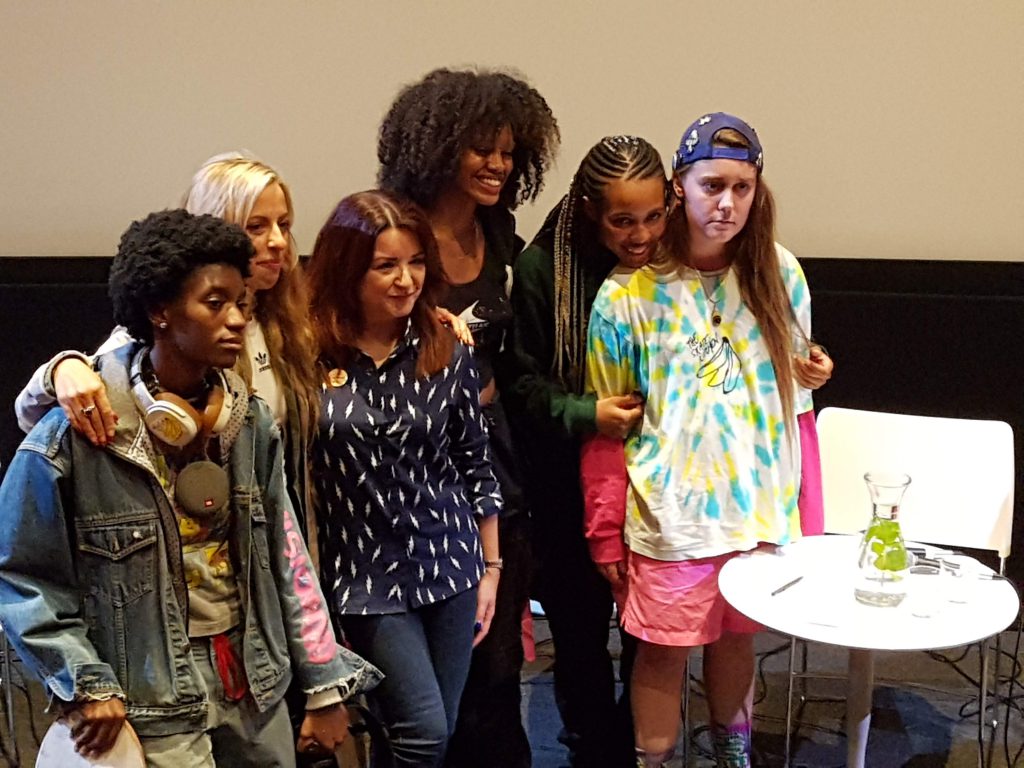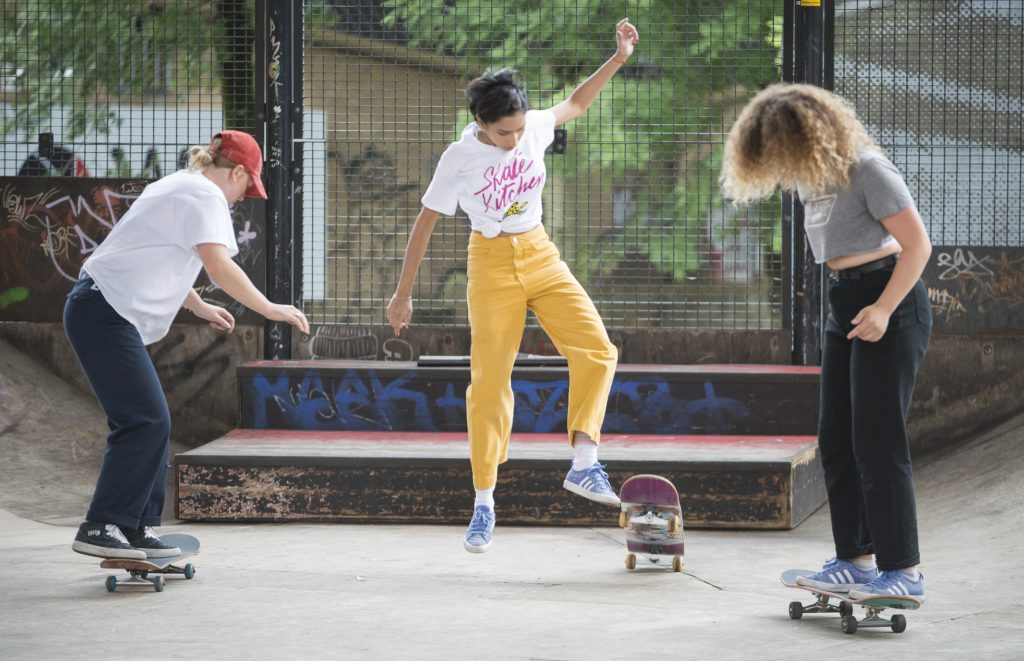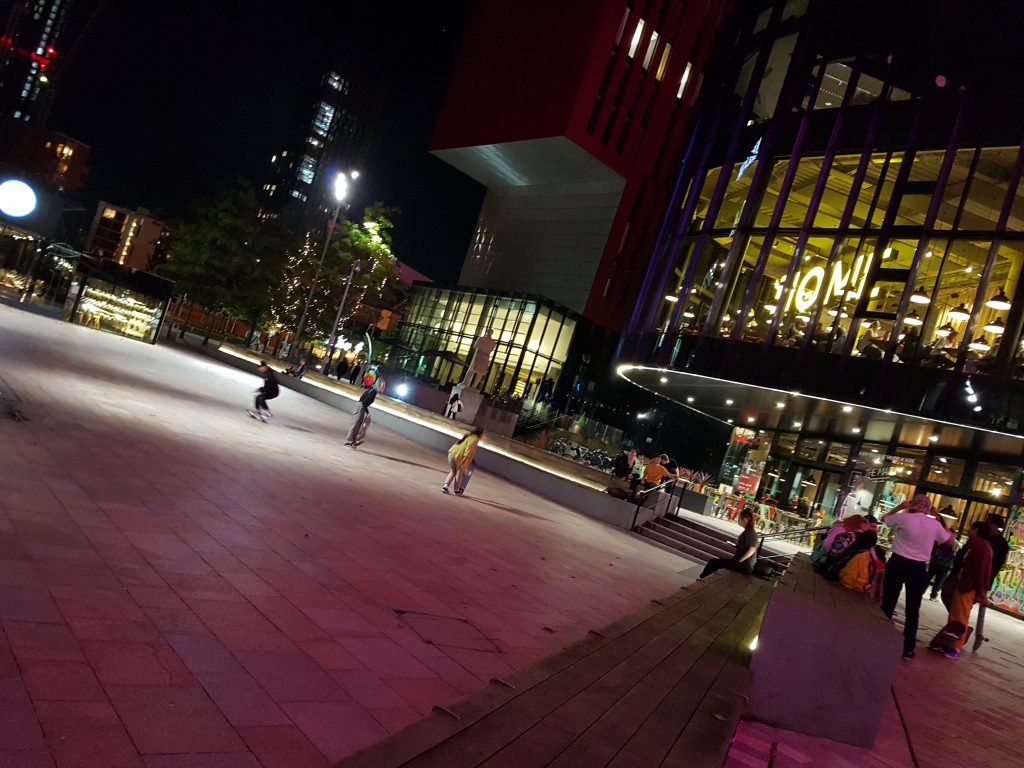
Skate Kitchen dives headfirst into New York’s skater subculture after the success of writer-director Crystal Moselle’s first feature documentary (winner of the 2015 Sundance Grand Jury Prize), Wolfpack, a disturbing, haunting film about seven siblings who are confined to their family home with nothing but films as a window to the outside world. Like The Wolfpack, where Moselle met her subjects running down a street in NYC, Moselle met the inspiration to this film, a real female skate crew, on a subway train. With her keen documentarian eye she was immediately captivated and made a short film based on their lives titled That One Day which was much applauded at the Venice Film Festival in 2016. Skate Kitchen is beautifully made in terms of both content and form; it serves its audience a unique balance of both of which I will explore in this article.
The film begins with Camille (Rachelle Vinberg, one of the real-life founders of the Skate Kitchen) skateboarding alone and sustaining a particularly violent injury triggering her mother to ban her from skateboarding. Camille rejects this and instead discovers the fascinating world of a female skateboarding crew, makes new friends and follows the trials and tribulations of adolescence and identity exploration. Although it may sound like a typical coming of age narrative trajectory, Skate Kitchen is anything but average.
Skate Kitchen tackles all the themes you would expect in a coming of age film; adolescent loneliness, notions of belonging, friendship and self-discovery but with a divergent and refreshing type of generational voice through the eyes of an alternative subculture. It refrains from focusing on hidden agendas, sabotage and manipulations; the somewhat tiresome, overused and offensive narrative tropes that have tended to be featured in not only films about young people, but in many female-led narratives being portrayed as typical and assumed female interaction. Instead, like the short, it is a story about connected, supportive women navigating a male-dominated world with no ulterior motives and no Mean Girls tropes. It’s a film about ‘alt girls’ who create a welcoming space for other women to be a part of their world. It is a celebration of uniqueness and diversity in adolescence and a divergence in what is expected of women. What is presented are fleshed out, real characters, perhaps in part due to the fact that the women are essentially playing versions of their off-screen selves. Growing up is not always punctuated with awkwardly clambering over one another for the latest crush or by having backstabbing friends; some of the film’s best moments are when we are just observing these women in their warm, empathetic naturality. Although at one point the narrative does explore a falling out over a crush it doesn’t fall victim to many of these instances. It’s refreshing to see that it’s not a patronising film about young people who need help; they are empowering each other, they challenge themselves and they take care of each other; this is a much-needed generational revelation.
However, Skate Kitchen is also as much about showing you the skill of skateboarding as it is about exploring friendship. The aesthetic style of the film equals the weight of the fully realised characters. What is shown with striking cinematography, editing and sound design is that skateboarding can be exhilaratingly euphoric but also dangerously painful; it hurts to skate. Nothing demonstrates this more effectively than in the opening scene where our young female protagonist gets ‘credit-carded’ and receives an extremely intimate injury, bleeding from between her legs all over the skate park (which in fact has happened to Vinberg twice). This is a metaphor in the grimmest sense forcing to mind strong links between coming of age, menstruation and skating.
The film is at its most captivating during its observational, almost ephemeral, dream-like montages of the girls skating through different environments; busy NYC streets, roads, alleyways and skateparks. It was apparently one of the most physically exhausting and ambitious shoots that Director of Photography, Shabier Kirchner, and the crew had ever done with custom-made skate-rigs, NYC traffic and heaving skateparks. However, it was not done in vein as the low angles, use of natural light, lens flares, tracking shots, follow shots and hand-held cameras make it feel like we are flying alongside them as one of them. The intimacy and movement of the cinematography allows us to be a part of this world, to enjoy the freedom and intoxication of this art form and to bask in the comradery of flying down the streets in unison with these friends without leaving our seats. We are shown in detail that what skateboarders can do with their bodies is incredible; the power, the skill, the danger, and we see them with (what seems like) effortless grace as skateboards become extensions of their own bodies; a versatile fifth limb. We feel the exquisite euphoria when they get it right and the agonising devastation when it doesn’t work out. Reminiscent of when watching parkour, the world is presented as their playground as they poetically negotiate the terrain and interact with their world in a unique way; everything becomes a potential interaction with the board; cavorting over metal, concrete, wood, steps, rails, benches and even people with precision. And unlike most other films or television shows that are set in NYC, the film is not monopolised by the usual landmarks dominating the landscape. Instead, NYC is kept low profile like a distant backdrop and forefronted are women dominating traditionally male dominated spaces.
The immersive authenticity of the cinematography allows us access and a closeness to the characters that make the viewer feel part of the gang and privy to their intimacies. The variety of shots, close ups, cutaways, the low light of the evening, the mixes of montages and the long takes brings you to one conclusion; there is so much to see in this film in terms of detail that you cannot possibly see it all in one screening. Each scene is so packed to the brim with rapidly edited skating skills (edited by Nico Leunen), nuanced characterisation and funny dialogue it leaves your head spinning. Worth noting also is the soundtrack by various artists, a chimerical, trancelike score by Aska Matsumiya as well as fantastic sound design (Supervising Sound Editor Coll Anderson and team) which takes you almost through the screen and straight into their world.
The scenes and the dialogue also adopt a cinema verite style; the elements are so naturalistic that it feels very much like we are watching a documentary with most of the narrative and dialogue coming from real-life authentic conversations. The film is populated with non-actors; mostly with women from the Skate Kitchen crew who already had a strong rapport with each other. The process for writing the narrative for the feature was a mix of recording conversations between the group, workshopping ideas and exploring experiences. The dialogue isn’t scripted; instead the girls were directed on where the scene needed to go but were left to it themselves as Moselle wanted to create a fictional film based very closely on the real experiences of what had really happened to these women and how they really talked to each other. The result is something special showing snapshots of characters’ lives in the form of naturalistic conversations that are funny and insightful; Moselle finds a delicate intimacy when capturing her subjects using a fly-on-the-wall aesthetic.
Skate Kitchen is a beautiful, refreshing look at women coming of age and figuring out who they are. It is also an introduction to a skateboarding world to those of us who have never seen it in action. It is very much a film about women in motion, both physically and metaphorically, moving forward to find their place and supporting each other to do so. It has an intoxicating energy to it and explores how skating is part of one’s identity, examining a subculture many may never have had a chance to glimpse before in such proximity. It also challenges the preconceived, archaic notions of what the wider world may think of who exactly skaters are; not simply just underground, delinquent teens who have a penchant for trouble. It challenges the idea of the skater; who skates, where you skate, how you skate and what you’re supposed to wear when you skate. It promotes individual flair; these girls have unique personal style that defies any fashion era or pigeonholing as we see them flying down the streets in the most eclectic range of show-stopping outfits (even more so in That One Day where we see some women skating in ball gowns, a particularly nice touch).
The Skate Kitchen crew’s voices have also carried well beyond the film and beyond where any of them expected them to go with the young women now in advertising campaigns (Nike’s first ever women skate shoe models) and becoming role models to other aspiring female skaters. The Skate Kitchen Q&A at HOME in Manchester September 2018 was a prime example of the wonderful effect and reach the film had. The audience was one of the most diverse and alternative women-centric audiences I had ever seen. Amongst the sea of many incredible hair colours and individual styles were people trying to rest their skateboards on laps during the film. It was inspiring to hear the cast and Crystal Moselle speak about the creative process and learn more about the girls and their journey from skate park to big screen.

Pictured above from right to left: Kabrina Adams Crystal Moselle, Kirsty Fairclough (Chair), Ajani Russell, Ardelia Lovelace and Nina Moran.
However, leading up to the HOME Q&A was Skateboarding Girls Takeover Manchester, created and led by Actor/Skateboard Coach/ Film Marketer Monic Sagar, an event where a huge group of female skaters joined by Moselle and the cast skated on mass from Projekts Skatepark all the way to HOME. It was a rare and very unique event because women skaters don’t usually skate the street in Manchester and the event was designed to help them gain confidence and give them a space to do it with the cast which meant a lot to the women attending and watching.

Credit Simon Webb
The skate girls of Manchester skateboarding with the cast post-screening was an encouraging and inspiring sight to behold and an example of how the film had reached audience’s even on a physical as well as emotional level..

The film is having a profound impact on the skating world and bringing to light the vast number of already established female skaters around the world. As films like this are made celebrating different types of women they have a potent generational impact (visualised in one emotive shot in the film of a little girl’s awe-struck face as she turns back and watches the impressive women skateboarders roll past her, owning the road together). Different types of women role models are needed in our current socio-political landscape more than ever and Moselle is providing more women with access to these role models by making a film like this which can only be commended.
Skate Kitchen smashes through the doors of traditional female roles, shreds along the half pipe of unique representation of female friendships and grinds against women-led narrative genre conformity. I can’t help leaving this filmic experience with a feeling of hope; it is uplifting to see a film that promotes the idea that identity doesn’t mean having to conform to one thing or another; we are and can be many things simultaneously and we can write the rules to our own identity and way of being. If this is the message of the next generation then this is society in motion, not just women.
Pictures supplied by HOME and Simon Webb

Ally Davies is the director of Aesthetic Realms and has worked in the creative arts industry in a variety of roles. Her academic career includes gaining a BA, MA and MPhil in Cinema and Screen Studies from the University of Manchester as well as attending Art School. Her MPhil specialist research area covered post-9/11 American politics and the audiovisual aesthetics and design in film and television space-based science fiction. She also likes pumpkins. A lot.

Ally Davies is the director of Aesthetic Realms and has worked in the creative arts industry in a variety of roles. Her academic career includes gaining a BA, MA and MPhil in Cinema and Screen Studies from the University of Manchester as well as attending Art School. Her MPhil specialist research area covered post-9/11 American politics and the audiovisual aesthetics and design in film and television space-based science fiction. She also likes pumpkins. A lot.
Copyright © 2019 Aesthetic Realms.
Website by Subzero.